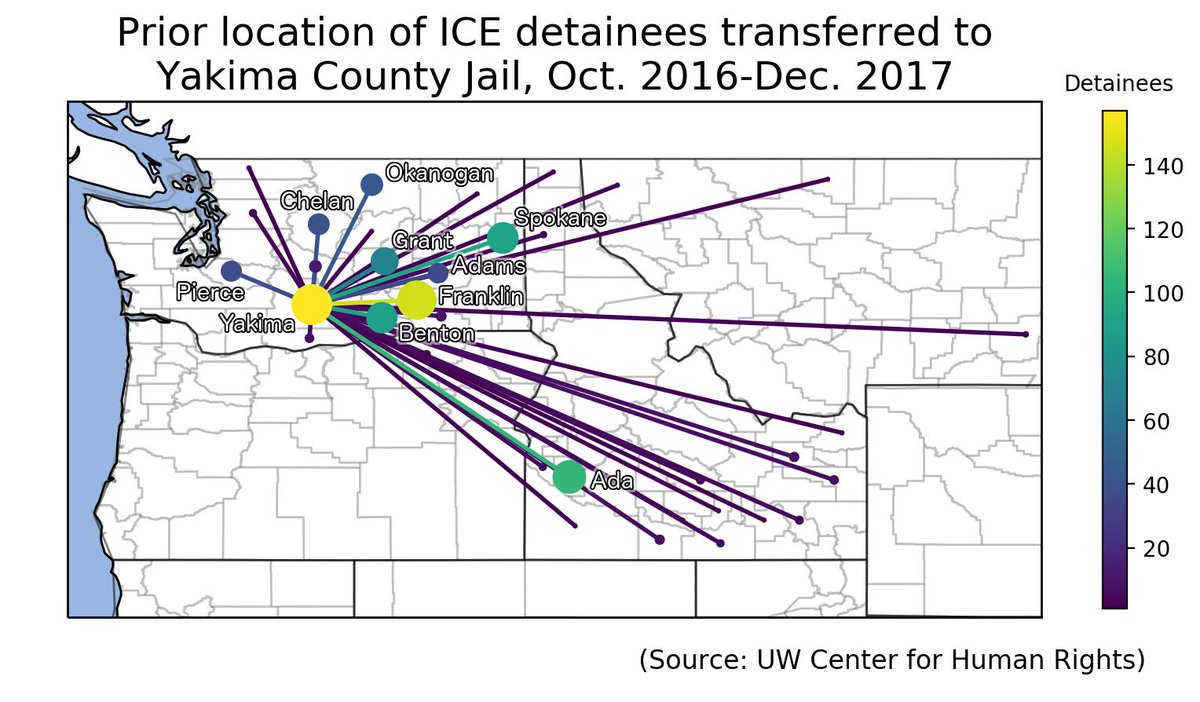Yakima's role in the immigration detention and deportation pipeline in the Pacific Northwest has expanded following the shift of #ICEAir flights from Boeing Field in Seattle earlier this year. Our latest report:
jsis.washington.edu/humanrights/20…
jsis.washington.edu/humanrights/20…
Each week, approximately 90 people now flow through Yakima in ICE custody (~30 via Yakima County jail, + ~60 via #ICEAir at the city-owned airport), destined for detention at the "Northwest ICE Processing Center" (f.k.a. Northwest Detention Center) in Tacoma, WA.
Each week, an additional 70 people on average move through Yakima for deportation via #ICEAir at Yakima Air Terminal-McAllister Field. The latest deportation flight arrived in Yakima from Phoenix, AZ just 10 minutes ago: flightaware.com/live/flight/SW…
Yakima's role as a hub for the detention/deportation pipeline is not new. For years, the Yakima County jail has held federal detainees from across the PNW on behalf of ICE, part of ICE and GEO Group's regional infrastructure surrounding the Northwest Detention Center in Tacoma. 

Since 2015, Yakima County has received well over a million dollars from ICE as reimbursement for holding federal detainees. It has also paid hundreds of thousands of dollars in legal settlements and to private counsel to defend the jail's unconstitutional ICE detainer practices. 

Meanwhile, Yakima Air Terminal, owned and operated by the City of Yakima, receives a small amount of revenue from each #ICEAir flight. City officials have also expressed concern that the airport could lose FAA grants if it takes action to limit ICE's access to the airport.
However, King County has not faced such consequences for its April Executive Order expressing the intention to stop #ICEAir flights at Boeing Field, and the subsequent decision by local aircraft servicing companies (called FBOs) not to serve flights carrying immigrant detainees.
It is important to be clear: #ICEAir's deportation flights are not normal flights. They involve shackled detainees bused onto the airport tarmac under private armed guard. Some detainees may have pending immigration proceedings which render their deportations unlawful.
Others are facing deportation to insecure conditions in countries they may barely know. Still others, like José Velarde Quiñonez, deported via Yakima Air Terminal on July 9, may have serious medical conditions which also increase the dangers associated with deportation. 

According to ICE, the majority of people being brought in by #ICEAir via Yakima are asylum-seekers from the southern U.S. border. Their incarceration in Washington State violates international and U.S. law, both of which recognize the right to seek asylum as a legal act.
At a time of growing concern about the human rights impacts of federal immigration enforcement, residents of Washington must recognize our local governments’ involvement in detention and deportation, and reckon with the implications. Read our full report: jsis.washington.edu/humanrights/20…
• • •
Missing some Tweet in this thread? You can try to
force a refresh





